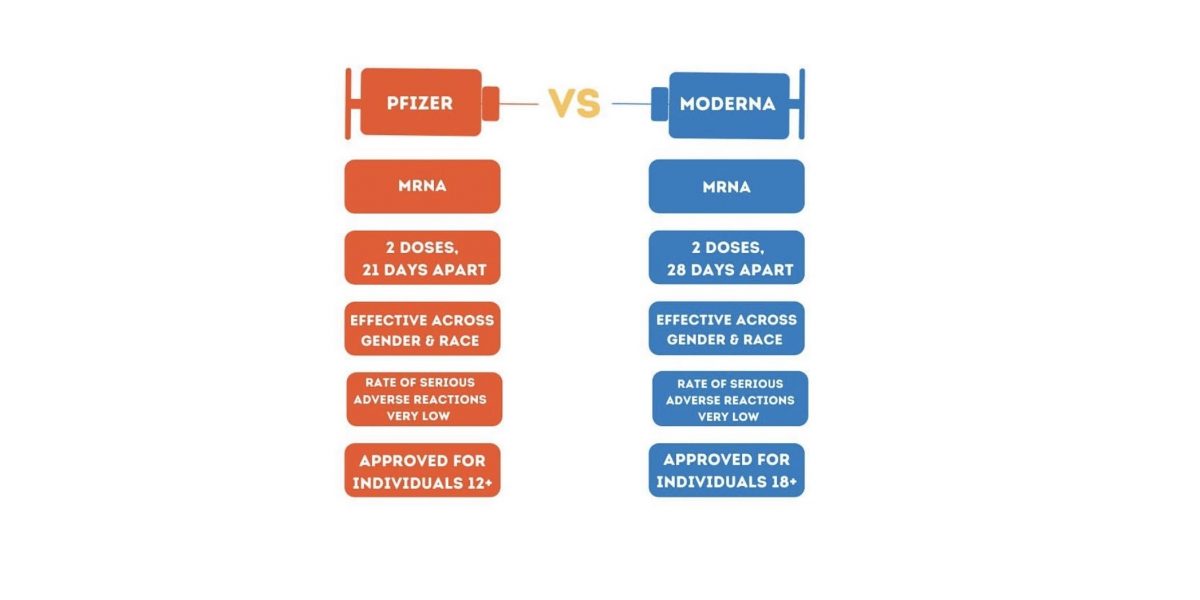It has been announced that there will be a delay in Ontario’s Pfizer vaccine delivery this week, which will impact the Marathon Family Health Team’s upcoming vaccination event on June 24th. We have been advised by the Thunder Bay District Health Unit (TBDHU) that some Pfizer vaccines will be available for the youth who are scheduled to receive a first dose, but that all adults 18+ will be offered the Moderna vaccine as a first or second dose.
We understand that this may cause concern for some, but both the Pfizer and Moderna vaccines are mRNA vaccines that work in very similar ways. This helps to explain why recommendation on vaccine interchangeability (vaccine ‘mixing and matching’) have recently been updated to suggest that individuals can safely receive one mRNA vaccine for their first dose and a different mRNA vaccine for their second dose (e.g., Pfizer for dose one and Moderna for dose two).
Many of you may be wondering about waiting to receive the Pfizer vaccine in order to complete you two dose series with the same brand of vaccine. Here’s why this is currently not being recommended by the TBDHU: Pfizer vaccines will continue to be delivered to Ontario regularly, but the TBDHU is not sure at this point how accessible this brand of vaccine will be in our district over the coming months. This means that, moving forward, we may be shifting towards using the Moderna vaccine for adults. So, delaying receiving your second dose because you are waiting for access to the Pfizer vaccine may only result in a longer wait until you can be fully vaccinated and receive strong protection against COVID-19.
Here are the key messages about vaccine interchangeability:
- If you received a first dose of Pfizer or Moderna, you can safely receive Pfizer or Moderna as your second dose since they are both mRNA vaccines
- If you received AstraZeneca as your first dose, you can safely receive AstraZeneca, Pfizer or Moderna as your second dose
- There are no significant differences between the Pfizer and Moderna vaccines
- Pfizer and Moderna have very similar side-effects
- Pfizer and Moderna are both highly effective at protecting from COVID-19 infection, hospitalization and death
- Getting whichever vaccine is offered to you first will allow you to be fully vaccinated and to get back to a version of normalcy sooner.
For more detailed information, please see below:
Is there a difference between the Moderna and Pfizer vaccines?
Efficacy: The Pfizer and Moderna vaccines are very similar in how they work and how effective they are against COVID-19. They are essentially identical at preventing hospitalization and serious illness. After 2 doses, Moderna is 94.1% effective and Pfizer is 95% effective.
Efficacy against variants: We are still learning how effective the vaccines are against the variants. Currently, it’s known that both mRNA vaccines provide high protection against the Alpha (B.117) variant. Moderna is researching how protection against Alpha and other variants can be made even higher.
Side effects: The side effects are very similar among vaccines. Those who receive Pfizer or Moderna may experience pain in their arm at the injection site, tiredness, headache, muscle pain, joint pain, or chills. Remember that side effects are normal and they are a sign that your immune system is doing what it’s supposed to do – make antibodies and build a defense against COVID-19.
Adverse events: Hundreds of millions of doses of Pfizer and Moderna vaccines have been administered worldwide. In Canada, the rate of serious adverse reaction for all vaccines, including Moderna, is very low: 6 people out of 100,000.
What is vaccine interchangeability?
The interchangeability of vaccines means you could receive one vaccine product for your first dose and a different vaccine product for your second dose to complete your two-dose vaccine series.
The current guidelines for vaccine interchangeability are as follows:
- If you had Moderna or Pfizer for your first dose you can safely take either Moderna or Pfizer for your second dose for strong protection. Both Moderna and Pfizer vaccines are authorized for use in Canada and use a similar mRNA technology, so the vaccines are safe to mix.
- If you had AstraZeneca for your first dose you can safely take either Moderna, Pfizer or AstraZeneca for your second dose for strong protection.
Is interchanging vaccines safe?
Not only is it safe, it’s effective. Interchanging vaccines is not a new practice. Similar vaccines from different manufacturers are used when vaccine supply or public health programs change. Different vaccine products have been used to complete a vaccine series for influenza, hepatitis A, and others.
Why is vaccine interchangeability now an option?
The priority is to receive two doses of a vaccine to complete the series and be fully protected. Having the option of mixing vaccines allows provinces and territories across the country to accelerate their second dose vaccine rollout and to fully vaccinate their populations sooner.
Getting the same vaccine for your first and second doses or getting one vaccine for your first dose and a different vaccine for your second dose are both considered valid options. Both options also provide excellent protection from COVID-19 and its variants, which is why it’s recommended to accept the first vaccine that is offered to you for your second dose.



